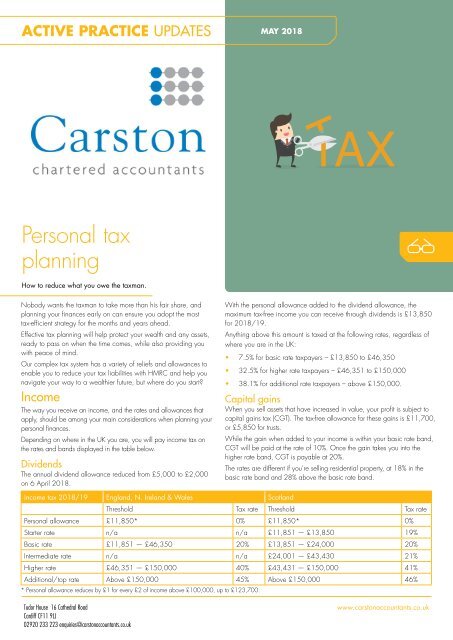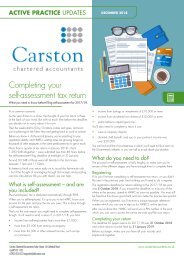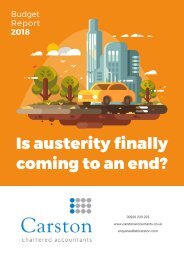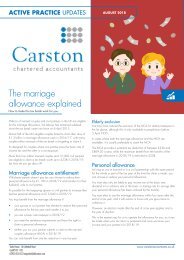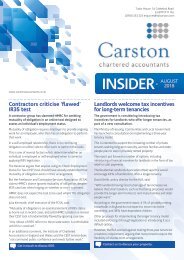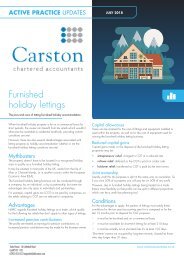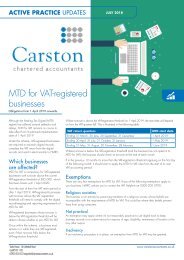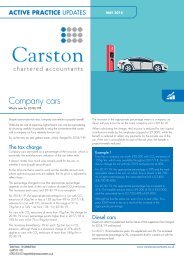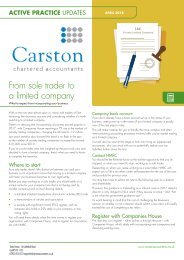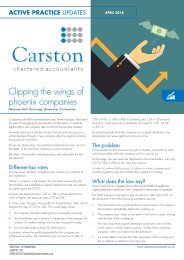Personal Tax Planning Update
Personal Tax Planning Update
Personal Tax Planning Update
Create successful ePaper yourself
Turn your PDF publications into a flip-book with our unique Google optimized e-Paper software.
ACTIVE PRACTICE UPDATES MAY 2018<br />
<strong>Personal</strong> tax<br />
planning<br />
How to reduce what you owe the taxman.<br />
Nobody wants the taxman to take more than his fair share, and<br />
planning your inances early on can ensure you adopt the most<br />
tax-eficient strategy for the months and years ahead.<br />
Effective tax planning will help protect your wealth and any assets,<br />
ready to pass on when the time comes, while also providing you<br />
with peace of mind.<br />
Our complex tax system has a variety of reliefs and allowances to<br />
enable you to reduce your tax liabilities with HMRC and help you<br />
navigate your way to a wealthier future, but where do you start?<br />
Income<br />
The way you receive an income, and the rates and allowances that<br />
apply, should be among your main considerations when planning your<br />
personal inances.<br />
Depending on where in the UK you are, you will pay income tax on<br />
the rates and bands displayed in the table below.<br />
Dividends<br />
The annual dividend allowance reduced from £5,000 to £2,000<br />
on 6 April 2018.<br />
With the personal allowance added to the dividend allowance, the<br />
maximum tax-free income you can receive through dividends is £13,850<br />
for 2018/19.<br />
Anything above this amount is taxed at the following rates, regardless of<br />
where you are in the UK:<br />
• 7.5% for basic rate taxpayers – £13,850 to £46,350<br />
• 32.5% for higher rate taxpayers – £46,351 to £150,000<br />
• 38.1% for additional rate taxpayers – above £150,000.<br />
Capital gains<br />
When you sell assets that have increased in value, your proit is subject to<br />
capital gains tax (CGT). The tax-free allowance for these gains is £11,700,<br />
or £5,850 for trusts.<br />
While the gain when added to your income is within your basic rate band,<br />
CGT will be paid at the rate of 10%. Once the gain takes you into the<br />
higher rate band, CGT is payable at 20%.<br />
The rates are different if you’re selling residential property, at 18% in the<br />
basic rate band and 28% above the basic rate band.<br />
Income tax 2018/19 England, N. Ireland & Wales Scotland<br />
Threshold <strong>Tax</strong> rate Threshold <strong>Tax</strong> rate<br />
<strong>Personal</strong> allowance £11,850* 0% £11,850* 0%<br />
Starter rate n/a n/a £11,851 — £13,850 19%<br />
Basic rate £11,851 — £46,350 20% £13,851 — £24,000 20%<br />
Intermediate rate n/a n/a £24,001 — £43,430 21%<br />
Higher rate £46,351 — £150,000 40% £43,431 — £150,000 41%<br />
Additional/top rate Above £150,000 45% Above £150,000 46%<br />
* <strong>Personal</strong> allowance reduces by £1 for every £2 of income above £100,000, up to £123,700.<br />
Tudor House 16 Cathedral Road<br />
Cardiff CF11 9LJ<br />
02920 233 223 enquiries@carstonaccountants.co.uk<br />
www.carstonaccountants.co.uk
<strong>Personal</strong> tax planning<br />
Extra income<br />
Some smaller amounts of income are tax-free up to annual limits.<br />
Under the government’s rent a room scheme, you can earn up to<br />
£7,500 a year tax-free from letting out a furnished room in your home.<br />
You can opt into the scheme if you’re a resident landlord, or if you run<br />
a bed and breakfast or guest house.<br />
This also includes renting out your spare room through websites like<br />
Airbnb, so you could take advantage of the allowance simply by<br />
letting a room to holidaymakers over short periods of time.<br />
The relief is halved if you share the income, for instance with<br />
your partner.<br />
If you let property that doesn’t qualify for the scheme, a £1,000<br />
allowance applies instead.<br />
There’s also a £1,000 allowance that applies to any income from<br />
trading, which could apply if you sell in small amounts on marketplace<br />
websites like eBay or Etsy.<br />
If you claim these allowances, you won’t be able to deduct any<br />
business expenses.<br />
Foreign income<br />
If you are UK resident but not domiciled in the UK, you may need to<br />
pay UK tax on your foreign income.<br />
Foreign income or gains for non-domiciled residents will be taxed if<br />
they come to more than £2,000 in the tax year, or if they’re brought<br />
into the UK, including if they’re moved to a bank account in the UK.<br />
If you have foreign income of more than £2,000, you may be able to<br />
claim the remittance basis.<br />
This means you’ll only pay tax on what you bring to the UK, but you’ll<br />
lose your tax-free allowances and may have to pay an annual charge.<br />
Savings<br />
Another way to become more tax-eficient is to look at how your<br />
savings are working for you.<br />
Whether you’re aiming to grow your wealth or just keep it protected<br />
from tax, it’s a good idea to think about where you’re putting money<br />
away each year.<br />
<strong>Personal</strong> savings allowance<br />
Your personal savings allowance allows you to earn up to £1,000 in<br />
interest from your savings each year, without paying any tax.<br />
This is reduced to £500 for higher rate taxpayers, and is removed<br />
altogether for additional rate taxpayers.<br />
ISAs<br />
Individual savings accounts (ISAs) are free of tax up to a value of £20,000,<br />
whether on interest or on income from investments.<br />
There are various types of ISA, including:<br />
• cash ISA<br />
• stocks and shares ISA<br />
• innovative inance ISA<br />
• lifetime ISA<br />
• junior ISA (for children under 18).<br />
You can choose to put all of your savings in one type of ISA or split<br />
them across others in any combination.<br />
However, keep in mind that you can only pay into one of each kind<br />
every year and some types have maximum annual contribution limits.<br />
Family matters<br />
Careful planning will help you to ensure inancial security for your<br />
loved ones, and to eventually pass an inheritance on to them.<br />
It’s important to consider the way you share income and gains around<br />
your beneiciaries, and the effect this will have on your marginal tax<br />
rate and available allowances.<br />
Marriage allowance<br />
If you earn less than your spouse or civil partner, you can transfer<br />
£1,190 of your personal allowance to them using the<br />
marriage allowance.<br />
This could reduce their tax bill by up to £238 in the tax year, and can<br />
be backdated to include any tax year since 5 April 2015.<br />
The marriage allowance is not available if you or your partner pay the<br />
higher or additional rate of tax.<br />
Inheritance of the family home<br />
There’s no inheritance tax to pay if you leave your home to your<br />
spouse or civil partner.<br />
If you pass it on to anyone else, such as a child or grandchild, it will<br />
be subject to inheritance tax (IHT) if its value is above the threshold<br />
(£325,000) at the date of death.<br />
An additional allowance – called the residence nil-rate band – is<br />
available when passing on the family home. This increased in<br />
April 2018 to £125,000.<br />
It works on top of the £325,000 basic nil-rate band when passing<br />
on the family home to your children or grandchildren (or other direct<br />
descendants), meaning you may be able to pass on the family home<br />
worth up to £450,000 in 2018/19 without paying IHT.<br />
A number of conditions apply, so be sure to seek expert advice to see<br />
if you qualify for this allowance.<br />
Pensions<br />
To achieve your goals for a comfortable retirement, it helps to plan<br />
ahead and take advantage of the available allowances.<br />
Your pension savings are free of tax up to your annual allowance,<br />
which is £40,000 for most people. You may also be able to bring<br />
forward any unused allowance from the last three tax years.<br />
If your threshold income is above £110,000 and your adjusted<br />
income is over £150,000, this allowance will be reduced by £2 for<br />
every £1 that the limit is exceeded. The minimum the allowance can<br />
be reduced to is £10,000.<br />
However, if you have withdrawn any lexible beneits, the money<br />
purchase annual allowance of £4,000 will apply instead of the<br />
annual allowance.<br />
The total amount you can save into a pension over the course of<br />
your life increased to £1.03 million for 2018/19. Your pension will<br />
trigger an extra tax charge if it is worth more than this threshold.<br />
Speak to us about your personal tax planning.


